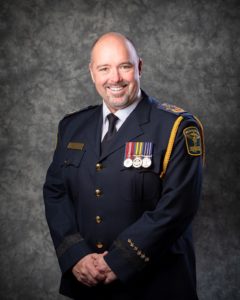Michael Nolan

Chief, Paramedic Service and Director, Emergency Services, County of Renfrew
Ambulance and Emergency Care Paramedic – Class of 1991
2021 Premier’s Awards Recipient
Michael Nolan was a 15-year-old high school student when his father suffered a cardiac arrest on an Ottawa street. Luckily, a passing pedestrian who knew CPR techniques was on hand to save him.
That was more than 35 years ago, but Nolan still regards that incident as the catalyst for his career in paramedicine.
“For me, that’s always been the defining moment that got me started in paramedicine,” says Nolan, recalling how he and other members of the family took courses in cardiopulmonary resuscitation after what happened to his father. “I was fortunate in that my father lived but it got me thinking about how to take care of people in similar circumstances.”
Nolan has been taking care of others since he graduated from Algonquin College’s Ambulance and Emergency Care Paramedic program in 1991. His career has sent him far afield, professionally and personally, earned him recognition, and allowed to him contribute to the profession through his leadership, advocacy, and the application of innovative technology.
He credits Algonquin for setting him up for success in his field. “Algonquin prepared me exceptionally well for my career,” he says, paying tribute to the late Jim Whittle, the one-time program coordinator who inspired him. “He instilled many of the values that I carry forward today about making sure you place service above self.”
Nolan’s service has been varied since leaving Algonquin. After graduation, he spent a few years in Toronto taking courses in advanced paramedic care to become a fully licenced critical care flight paramedic. When he wasn’t in the classroom, he was flying to remote communities in northern Ontario to provide paramedic services.
“From a medical perspective, it was the Wild West. We’d take fixed-wing aircraft or floatplanes or helicopters, whatever could fly that day, as far north as to Hudson’s Bay or James Bay – this was before GPS or satellite phones – and you never knew what to expect.”
Nolan still appreciates the unexpected. During his career, he’s taught health medicine at Holland College on Prince Edward Island, been Deputy Chief of the Ottawa Paramedic Service, and Director of Emergency Management for the City of Ottawa. He’s worked as a consultant for governments around the world, advising them on paramedic systems and best practices. He’s served as president of the Canadian Association of Paramedic Chiefs and, currently, he’s the Vice President of the Ontario Association of Paramedic Chiefs. He’s also received the Governor General’s Emergency Medical Services Exemplary Service Medal and the Queen’s Jubilee Medal for his contributions.
Fifteen years ago, Nolan became Chief of the Paramedic Service for the County of Renfrew. “It was a great opportunity to have my own service, work in a community with great health service needs, and have a chance to work with a staff that wanted to make the service even better.”
Throughout his career, Nolan continued to upgrade his skills and deepen his knowledge. Before taking the Renfrew County position, he completed a Master of Arts degree in Leadership Studies at Royal Roads University. Postgraduate courses in conflict studies followed. Since then, he’s written for trade journals and contributed scholarly articles to advance the academic study of paramedicine and professionalize the paramedic field.
Nolan foresees paramedicine moving beyond the traditional response-based 911 service to one that provides diverse services throughout the community. For example, he believes many of the calls paramedics respond to now would be unnecessary if they took on a preventative role of helping vulnerable populations avoid the need for emergency services. “Why not use paramedics to keep people from needing emergency care?”
Nolan’s aptitude as a change agent is evident in a recent endeavour – using drones to deliver paramedic services. The County of Renfrew has acquired a small fleet of drones that it uses for everything from search-and-rescue operations to emergency deliveries. “We’ve delivered defibrillators, medication, and even an EpiPen to someone in distress,” he says.
The drone fleet is an example of how the paramedic profession is changing, says Nolan. “The challenge for me is how to integrate new technology to serve old needs and optimize patient care at the same time.”
On that point, Nolan has some advice for students: “In the next 30 years, students won’t even recognize the profession that they are being trained for today. I highly recommend paramedicine at Algonquin because it challenges people not only to do their best but also to grow within a profession that is changing and evolving.”